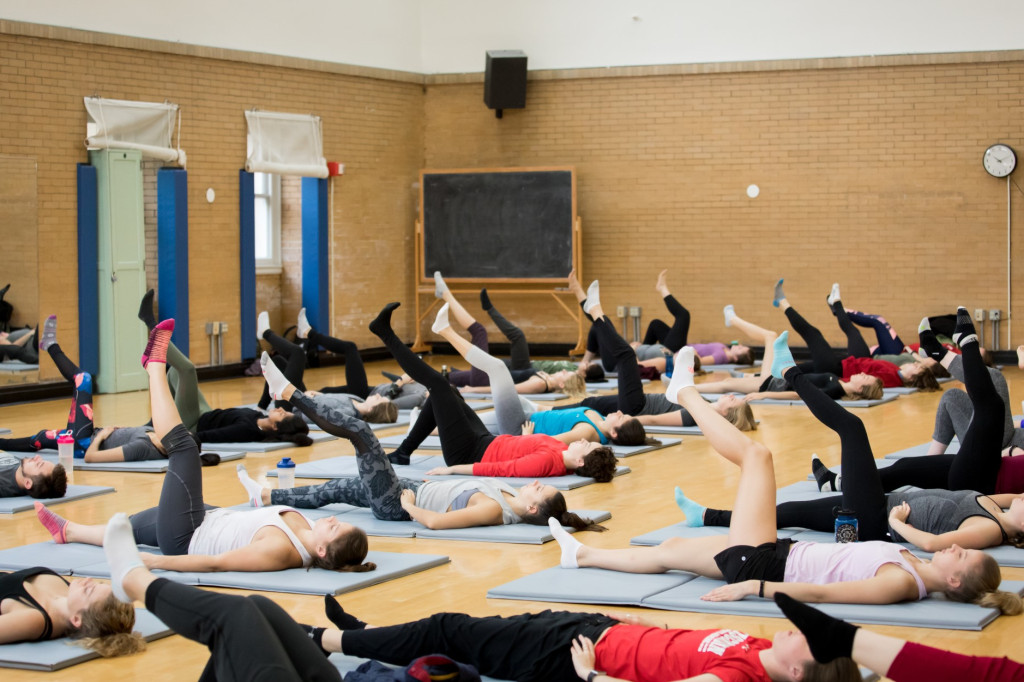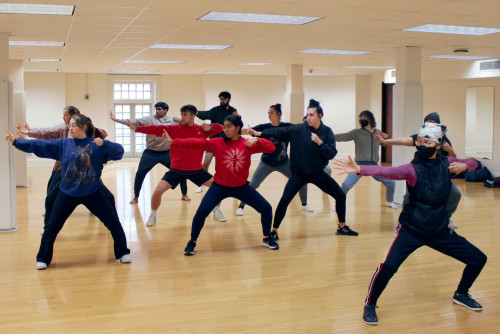Don’t want to major in it? Get a certificate!

In the Pilates certificate, students receive hands-on practice in the studio.
College is a great time to broaden your horizons, both inside and outside the classroom.
Certificates provide a unique opportunity to explore specific subjects and interests, either aligning with your major or focusing on a different area entirely.
Certificate programs typically span 12-18 credits and offer a chance to delve into specific topics in subjects like art, science, and humanities. If you’re still figuring out your academic path, here are seven of the nearly 100 certificate programs to check out, along with comments from students who chose them. A full list of certificates can be found here.
“A certificate program is a great way to enhance your undergraduate experience by sampling the breadth of academic disciplines available here at UW–Madison,” says Kelley Harris, Director of Cross-College Advising Service. “Certificates can provide a student with additional expertise beyond just their major.”
Launched just last month, the architecture certificate is a brand-new program offered through the Department of Art History in collaboration with various engineering, design studies, and architecture departments. The program offers courses in various disciplines, including civil engineering, art history, and land architecture. The certificate is a 15-credit minimum and is open to all students.

Students learn new moves in Folklore 319: Afro-Asian Improv: From Hip-Hop to Martial Arts Fusion.
Interested in the everyday lives of people in diverse communities worldwide? Explore the 12-credit Folklore program, which delves into patterns of behaviors, ideas, art, and traditions of various groups.
“Studying folklore means you study how the average person in that area and time interacted with others and dispersed their culture(s),” sophomore and folklore student Heewone Lim says. The program explores folklore in central, eastern, and northern Europe and even right here in Wisconsin.
Calling all puzzle, game, and video game enthusiasts: explore your passion through the Game Design certificate program offered by the Curriculum and Instruction, Art, and Computer Science departments.
One notable course is “Game Design 2,” a collaborative class where students work together to create a game over a semester.
David Li, a senior majoring in computer science, particularly liked this course. “It really gives you a good taste of what it’s like to work in the industry,” Li says.
Li decided to pursue the certificate due to his lifelong passion for games. “It was only when I learned about the certificate here that I decided it was what I wanted to do post-graduation,” Li says. The course is an 18-credit minimum and combines computer science, art, and design courses.
This 15-credit certificate program explores history, literature, and art in Europe and the Mediterranean from approximately 300 to 1500 AD. Students can enroll in courses including art history, English, and music. Some students, like Katie Belfi, a junior, enjoy the program because it introduces foundational aspects from this historical period.
“I’m a pre-law student,” Belfi says, “[so] I’ve been enjoying learning about some of the earliest foundations to our current legal system.” Belfi decided to pursue the program after completing History 476: Medieval Law and Society. “My favorite part has definitely been the legal studies,” she says.
Combining classical mat and equipment-based practices, this certificate provides students valuable hands-on experience and instruction in Pilates. The program is particularly popular among students majoring in dance, kinesiology, or other movement/health-related fields.
Cindy Stefanek, a senior double majoring in dance and health promotion & health equity, began the certificate after using Pilates to cross-train and build strength.
“I had been prone to injuries from dance because of how flexible my ankles were… Pilates helped me get stronger,” Stefanek says. For Stefanek, the best part of the program was its sense of community.
“I was able to get to know my peers and form relationships,” Stefanek says, “We formed a little community that supported each other.”
Not all certificate seekers are majoring in health disciplines. Gabbie Puma, a Ph.D. student in Special Education, chose to pursue the certificate driven by her passion for practicing and instructing Pilates. “[My] favorite part… is learning so much about how bodies work and getting stronger,” Puma says. The program has a minimum credit requirement of 20 and is open to all students.
Activism and classroom learning come together in this 12-credit program offered by the School of Education. Learn about educational justice, sustainable communities, and the history of education in this country.
Senior and History major Kylie Hollenstein decided to pursue the certificate after learning about inequity within her education courses and wanting to go deeper.
“I appreciate the ability to focus on what I’m most passionate about,” Hollenstein says.
Suneil Jurgensen, a junior majoring in Psychology, is also receiving the certificate and noted that social justice and education are deeply intertwined. “It’s hard to understand one without the other, especially when thinking about inclusive and equitable education,” Jurgensen says.
If you are passionate about news and sports, the Sports Communication certificate program might be for you. This 12-credit program caters to journalism and non-journalism majors, offering sports marketing, mass media, and social impact coursework. The program is also designed with flexibility, allowing students to take courses online and during the summer.
The Certificate in Theatre is designed to be flexible enough for a student to pursue an individualized focus of study in an area of their interest, whether it’s acting, technical theater focus, costuming, scenic design, or stage management. Or, a student may meet with the theatre advisor to create a custom focus that supplements and bolsters their primary degree path.
If you want to learn more about certificate options, a conversation with your academic advisor is a great place to start. Find an Advisor.




